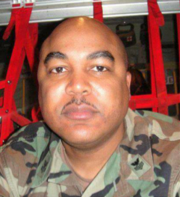From U.S. Navy Officer to MedTech Product Support Specialist
Kenneth Morton served our country as an officer in the United States Navy for twenty years. Today, Kenneth serves people in need in different but equally meaningful ways as a Product Support Specialist at a medical technology company that is pioneering innovative solutions for treating cancer.
“I am lucky; my job is fulfilling and rewarding,” said Kenneth. “And I work in an industry that is committed to hiring transitioning military veterans to good-paying jobs, in roles that are not just for scientists or engineers, but for people with skills in human resources, finance, logistics and the supply chain, among others.” Veterans can fill any role, from entry level all the way up to the CEO.
In his role, Kenneth provides real-time virtual technical support to leading medical institutions across the country to ensure cancer patients get the radiotherapy treatments they need. Since fifty to sixty percent of people with cancer will need radiotherapy at some point during their treatment, his job is mission critical.
The skills Kenneth honed in the Navy as an aviation electronics technician are serving him well in his current position. During his naval career, he managed software systems and learned how to maintain, troubleshoot and repair sophisticated equipment.The military also taught him how to stay calm in high-pressure situations and get issues resolved.
In addition to the technical skills that veterans bring to the table, research indicates that members of the military possess important soft skills that make for valuable and productive members of just about any business organization, including high levels of resiliency, advanced team building skills, and strong organizational commitment. However, these skills are often harder to communicate with prospective employers.
Organizations like MVPvets (MedTech and BioTech Veterans Program), a group that assists and prepares transitioning military veterans for meaningful employment in the life sciences industry, are available to help prospective employers evaluate those soft skills – like critical thinking, team-building and leadership – and match veterans with mentors, jobs and career resources. To date, more than 1,450 veterans have participated in the MVPvets program and have either gained employment in high-quality jobs within the life sciences industry or have improved their current employment situation and job readiness post-military transition.
The medical technology industry is committed to hiring transitioning military veterans in good-paying jobs. “When I left the Navy in 2010, I knew I wanted a job that made a difference,” Kenneth said, “but I wasn’t sure what that would be. Of course I knew about cancer, but I wasn’t familiar with radiation oncology. Today I have a job that matters. I make sure that the patient on the table gets the treatment they need, when they need it. It’s an overwhelmingly satisfying job.”
